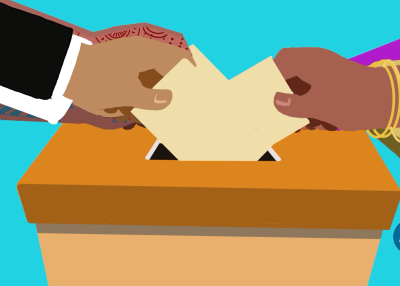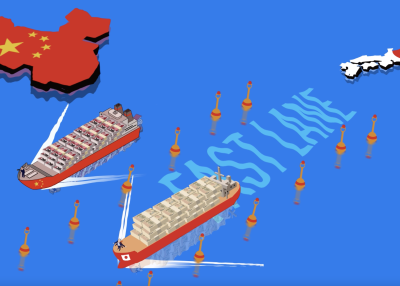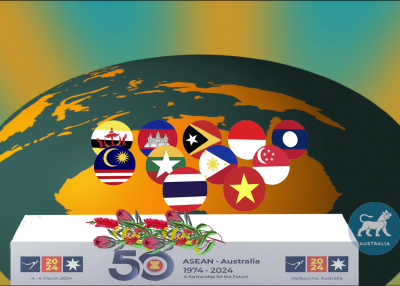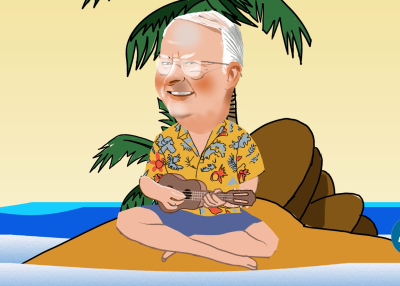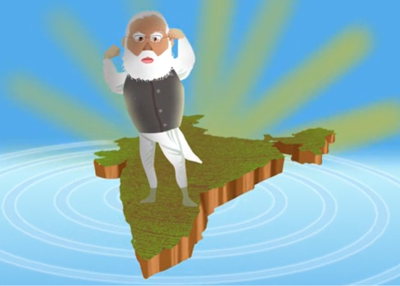Briefing MONTHLY #52 | July 2022
Pacific diplomacy | After Abe | Chinese influence | Asia’s COVID recovery | PNG’s slow vote
Animation by Rocco Fazzari.
FAMILY MATTERS
It was hardly a surprise after Pacific relations became such an unexpected election turning issue for Labor: Prime Minister Anthony Albanese finished his first Pacific Islands Forum declaring he had increased Australia’s regional influence.
Without specifically mentioning the competition for diplomatic space with China, he declared: “I’d rather not comment on someone else’s influence. But these things are all relative by definition. If Australia’s increasing our influence, then that has an impact.”
The 2022 Forum was certainly an auspicious event for the incoming Labor government to meet the “Pacific family” as the first in-person meeting since 2019, the first full meeting in Fiji for more than a decade due the country’s interrupted democracy and the delayed launch of the 2050 strategy for a Blue Pacific Continent.
And from the State of Origin rugby viewing with some fellow leaders to the theatrical hug with Solomons prime minister Manasseh Sogavare, Albanese, foreign minister Penny Wong and Pacific minister Pat Conroy brought a new tone to the near abroad of Australian diplomacy.
But they should be in no doubt that Forum secretary general Henry Puna’s tart comment about China’s pressure for a regional security agreement could equally come back to haunt Australia: “If anybody knows what we want, what we need, and what our priorities are, it’s not other people, it’s us.”
Apart from the listening tour, Australia stepped up engagement by announcing a trial of Pacific aged care workers in Queensland; finalising Australia’s biggest single regional investment outside resources, the Telstra purchase of Digicel; endorsing Vanuatu’s bid for an International Court of Justice opinion on climate change; and backing a Pacific team in Australia’s rugby league competition.
But the work of bedding down the new government’s flagship changes to Pacific aid now starts, just as it faces immense pressures to cut Budget spending and deal with emerging political issues at home.
The much talked up Pacific Climate Infrastructure Financing Partnership will need to make more progress than the parallel Papua New Guinea electrification partnership announced at the 2018 Asia Pacific Economic Cooperation summit in Port Moresby. And the Development Policy Centre’s Stephen Howes has outlined some complicated questions about how to fairly carve up Labor’s promised 3000 annual permanent resident worker visas for Pacific countries.
Meanwhile after a devastating two pandemic years for the tourism dependent Pacific region, last week’s Asian Development Bank economic update contained some welcome good news with a significant upgrade in its Pacific growth forecast from 3.9 per cent to 4.7 per cent. This is largely due to a stronger than expected recovery in Fiji tourism.
- Jessica Collins has a good wrap of how the Forum week unfolded at the Lowy Institute’s The Interpreter here.
NEIGHBOURHOOD WATCH
AFTER ABE
Almost a month after the assassination of Japan’s longest serving prime minister Shinzo Abe, the focus is turning from the unifying shock to more long-term questions about what it means for the future of the country.
That is reflected in the debate about whether the government’s decision to hold a rare state funeral for Abe in September – the first since such an event for post-war leader Shigeru Yoshida in 1967 – will divide or unify public sentiment about Abe’s legacy.
Abe’s deft use of his long term in office and diplomatic skills to raise Japan’s profile in the world has been underlined by the tributes to his leadership from around the world including heartfelt obituaries from former Australian prime ministers Kevin Rudd, Tony Abbott, and Malcolm Turnbull. Indeed, it says something about the changing dynamic in the ever-growing Australia-Japan relationship under Abe that he saw off six Australian counterparts during his time in power.
Rudd observed: “The Chinese may not have liked Abe, but they respected him,” Abbott argued: “Australia has never had a better friend from Japan,” and Turnbull recalled: “We shared the fun of doing or seeing something new.”
The Abe legacy debate now involves three broad but inter-related themes.
Will Abe’s muscular approach to Japan’s role in the world will be sustained? Incumbent Prime Minister Fumio Kishida has said he will pursue this legacy which involved changing Japan’s pacifist Constitution. But he comes from a different strand of more liberal foreign policy thinking in the Liberal Democratic Party and may not have the determination of Abe on this issue if public opinion support wanes.
How much did Abe really change Japanese politics with his highly centralised approach to government? Abe sustained his power after the prime ministership by running his party’s largest faction. Kishida now has a freer hand but may become more vulnerable to a return of party and bureaucratic factionalism.
How is Japan managing its economic and social challenges as an embryonic post-industrial society? Abe’s strong and sustained leadership papered over the cracks in his eponymous Abenomics economic reform program, but Kishida has acknowledged weaknesses with his call for a new form of capitalism. The shooting has also highlighted the influence of conservative social or religious groups in Japanese life when national policy is focused on modernising objectives such as increasing female participation in the workforce.
- Former Australian ambassador Bruce Miller says in The Australian Financial Review that what differentiated Abe from most of his predecessors was “his willingness to push change through once he gained a critical mass of support, and not wait for everyone to come on board.”
- But Sophia University’s Koichi Nakano argues in The New York Times that Japan should now shift from Abe’s nationalist agenda to “allow domestic resources to be focused on the economy and open the door for better relations with Japan’s neighbours founded on peace through diplomacy.”
MARCOS MARK 2
Newly elected Filipino President Ferdinand Marcos junior sidestepped the two clouds overhanging his new Administration in his first major speech as president, instead focussing on reviving economic growth.
In his first State of the Nation address he said he was aiming to push economic growth to as high as eight per cent a year during his term, a level not seen since the 1970s. But he steered away from any references to how he would manage relations with China or the legacy of corruption and human rights abuses that occurred under his father’s leadership which ended in 1986.
While the new president made pro-China comments before and after his election and defended his father’s regime, he appears to be trying to divert attention to a more positive agenda as he fashions a different image to his father and the erratic behaviour of former president Rodrigo Duterte.
The address to Congress played down the likelihood of more pandemic lockdowns in one of the Asian countries worst hit by COVID, talked up a new private-public infrastructure partnership and new measures to improve agriculture productivity.
While Marcos implicitly touched on the South China Sea territorial dispute with China by saying he would never “abandon even a square inch of territory,” he declared “the Philippines shall continue to be a friend to all. And an enemy to none.”
CHINESE INFLUENCE
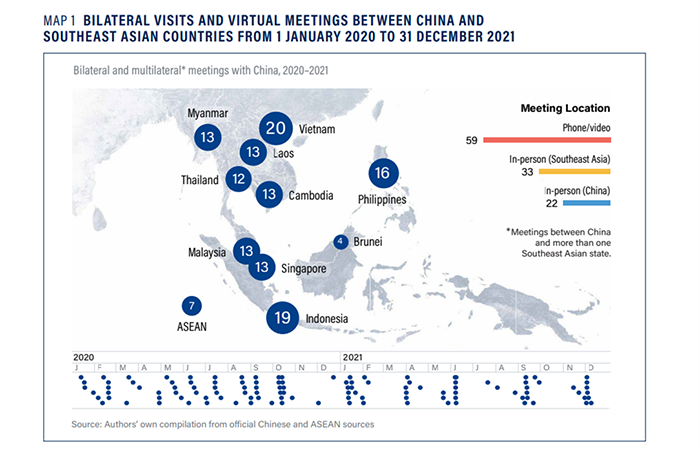
China has increased its influence in Indonesia during the pandemic but possibly undercut its once rising stature in the Philippines while maintaining clout in Thailand, according to a new report on Chinese diplomacy in Southeast Asia.
But despite this varied outcome with some of the region’s largest countries over the past two years, the report suggests Chinese influence is likely to increase overall in the long term compared with other external countries.
The Asia Society Policy Institute report tracks the flow of China’s aid and diplomatic activity in Southeast Asia over the two pandemic years, noting how it maintained a high level of personal diplomatic outreach and won prime mover kudos by providing pandemic health assistance early on.
“China used its ‘discourse power’ and heavy presence in local media to hit back at criticism of its early mishandling of the pandemic and to portray China as a responsible great power standing shoulder-to-shoulder with the region in its time of need. Southeast Asian countries pragmatically declined to participate in global finger-pointing over the origins of the pandemic,” it notes.
With China’s influence likely to rise due to its geographic and economic proximity to Southeast Asia, the report argues that other partners from Australia to the US need to give more substance to existing engagement policies and be prepared to implement them more forthrightly in future.
“Influence building can go a long way when the diplomatic basics are done well and consistently. That means regular engagement at senior levels in Southeast Asia, as China did even through the pandemic,” the report says.
ASIAN NATION
TIMOR TIES
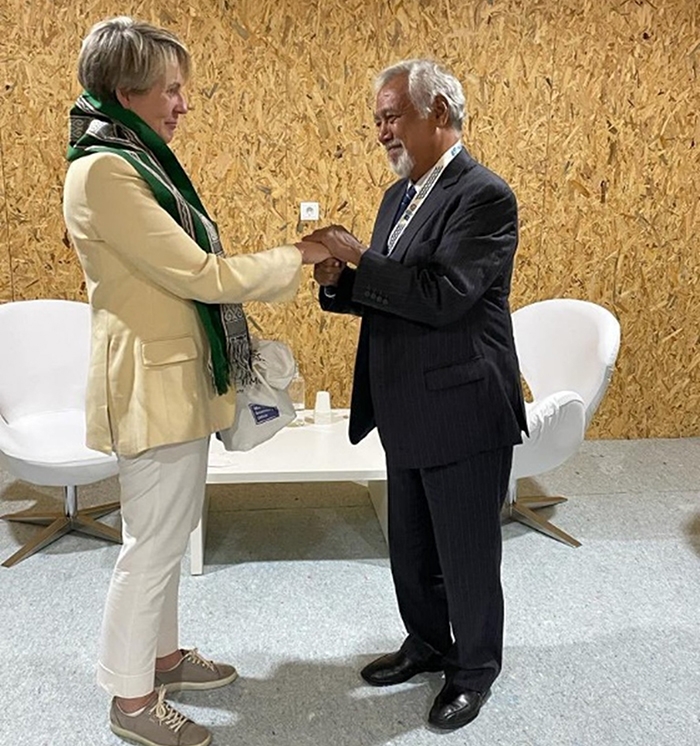
Tanya Plibersek and Xanana Gusmao at an environment conference in Portugal.
Former and possibly future Timor Leste prime minister Xanana Gusmao delivered a subtle message about how old ties can run deep in bilateral relations by pointedly thanking Tanya Plibersek for her role in ending the long running Timor Cabinet espionage prosecution.
Attorney General Mark Dreyfus took the unusual decision on July 7 to terminate the prosecution of Canberra defence lawyer Bernard Collaery for his role in defending the intelligence officer who complained about Australia’s eavesdropping in 2004 on the Timor Government during seabed boundary negotiations.
Dreyfus pointedly noted that the decision to end the prosecution which has been in train since a raid on Collaery’s office in 2013 had been based on partly on “Australia's relationships with our close neighbours”. Timor has stepped up its efforts to become a full member of the Association of Southeast Asian Nations this month during Indonesia’s leadership of the group. And, like the Solomon Islands, it has welcomed offers of assistance from China.
While Gusmao said he had raised the Collaery issue with Prime Minister Anthony Albanese and his predecessors, he emphasised the role Plibersek had played saying she had “showed a profound understanding of Timor-Leste’s concerns about the prosecution and took such prompt action to raise the matter within her government.” Plibersek had made resolving the seabed boundary between Timor and Australia a key issue when she was Labor foreign affairs spokeswoman before being replaced by Penny Wong in 2016.
COLOMBO PLAN REDUX
The federal Opposition has raised concerns about the future of the former government’s New Colombo Plan for student travel to Asia which has so far supported more 40,000 Australian students to study or do internships in regional countries.
Former education minister and now opposition spokesman Alan Tudge told the Universities Australia annual conference that now was not the time to change the scheme or its name when Australia was trying to rebuild ties to Asia post-pandemic. “Geopolitically this is a time for strengthening the relationships in our regions which the New Colombo Plan does,” he said.
The New Colombo Plan, was established in 2014 as one of former foreign minister Julie Bishop’s flagship foreign policy initiatives, but the new Labor government has not announced any specific new policy on the scheme.
However Foreign Minister Penny Wong spoke enthusiastically about the original Colombo Plan – which brought Asian students to Australia from the 1950s – when she visited her birth country of Malaysia in June.
She noted that the scheme had defined the life of her father who used it to study architecture in Adelaide. “The value of that education has never left him. He always told me: ‘They can take everything away from you, but they can't take your education,’” she said.
AUSTRALIA AND IPEF
The Biden Administration should draw on Australia’s expertise doing capacity building and training in its immediate neighbourhood in order to make its proposed Indo-Pacific Economic Framework more attractive to its initial membership, according a new report.
The report by analysts from the Australian Strategic Policy Institute and based on interviews with unnamed Australian government and industry officials says IPEF is viewed as an innovative way to boost regional investment rather than as a mechanism to strengthen the substance of trade agreements, such as through market access into the US.
“It will be essential in the early development of IPEF to move beyond broad statements toward action on key issues of concern, like supply chain resilience, international technology standards, and tech cooperation on the green economy,” the report says of the competition to deliver outcomes in addition to the existing trade deals such as the Regional Comprehensive Economic Partnership and the Comprehensive and Progressive Agreement for Trans-Pacific Partnership.
It cites the Australian Infrastructure Finance Facility for the Pacific as an example of an Australian program which could be used as a model for ensuring IPEF countries have the capacity to engage with the latest US attempt to restore its economic diplomacy in the region.
DEALS AND DOLLARS
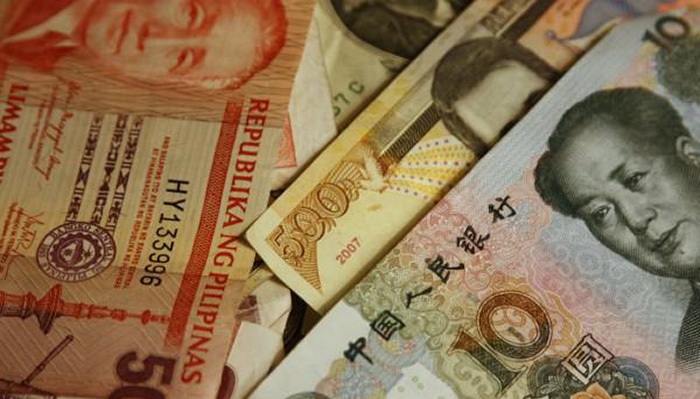
JAPAN'S TAX WARNING
The Japanese government has taken the unusual step of criticising the Queensland Labor government new tax regime for coalminers, warning that it might cause its companies to reconsider whether the state remained a “safe and predictable” investment destination.
The country’s ambassador Shingo Yamagami told a University of Queensland function the tax risked damaging “trust and goodwill” built up over years as Japanese mining companies paid billions of dollars in tax.
He warned that reaction to the move could extend beyond the coal industry to new areas of co-operation, including efforts to shift towards cleaner energy sources and reduce carbon emissions.
“Some Japanese companies are already questioning whether Queensland will continue to be the safe and predictable place to invest they had known for decades,” Mr Yamagami said. “Make no mistake: this is a huge shock for Japanese companies,” he said. “The future of the successful partnership between Japanese businesses and Queensland, as a competitive investment destination could be at great risk.”
Queensland Premier Annastacia Palaszczuk met Yamagami this week to discuss the criticism.
BANGKOK BITTER
Asia is looming as the new frontier for Australian low-alcohol beer after breaking into the bottle shops at home. After launching plans for the largest non-alcohol brewery in Australia, Heaps Normal has declared Southeast Asia is a potential new market.
Co-founder Andy Miller told The Australian the company was targeting Hong Kong after successfully distributing the product in Singapore and Malaysia. “We really see Southeast Asia as Australia’s backyard,” he said.
Miller, one of four founders and now based in Bangkok, said: “I think there’s a massive opportunity for non-alcoholic beer in Thailand. It’s exciting to see a lot of movement in the craft beer scene in Bangkok, and seeing independent producers.”
SEASICK BOATS
Shipbuilder Austal has been forced to embark on repairs to the fleet of patrol boats which Australia has given Pacific countries as part of a $2.1 billion defence aid program in the former government’s Pacific Step-up.
The new Albanese government revealed in early July that major design and construction flaws had been identified in the boats, including in some cases poisonous carbon monoxide being pumped into the ship, forcing limits on their operation. The faults prompted Defence Department officials and engineers from the shipbuilder Austal to urgently visit the recipient countries to arrange a repair program before Prime Minister Anthony Albanese visited the region for the Pacific Island Forum.
Fifteen boats have been delivered so far, with the latest boat handed over in May to the Cook Islands at a ceremony in Perth attended by Defence Personnel Minister Matthew Keogh.
DIPLOMATICALLY SPEAKING
"France, Japan, the UK, US and China have all played a role in the Pacific for many, many years. It would be wrong to characterise this engagement, including that of China, as new. It would also be wrong to position the Pacific in such a way that they have to pick sides."
- New Zealand Prime Minister Jacinda Ardern, Lowy Institute, July 7
"Australia's position is very clear. That we are going through a period of strategic competition in the region, that perhaps it wasn't there a decade or more ago, that under Xi, China has changed its position. It is more forward leaning. It is more aggressive. Australia’s position is that we will continue to engage and co-operate, we want to co-operate with China where we can. But we will stand up for Australian values when we must."
- Prime Minister Anthony Albanese, media conference, July 8
"We must not otherwise characterise this as a war of the West versus Russia or democracy versus autocracy. It is not. Nor should we naturally assume it is a demonstration of the inevitable trajectory in other areas of geo-strategic contest. In the wake of the tensions we see rising, including in our Indo-Pacific region, diplomacy must become the strongest tool and de-escalation the loudest call."
- Ardern, July 7
"It's just extraordinary that the Ukrainian people defending their homeland are showing courage and resilience. And they are fighting not just for their homeland, they are fighting for all those who believe that sovereign states should be left alone, all those who believe that you should be standing up to a bully. And what we are seeing here from Russia is just that, a breach of international law, a breach of the UN Charter, something that can't be allowed to just be waived through because of the implications that are there for the world order, including in our own region."
- Albanese, July 8
DATAWATCH
ASIA'S COVID BOUNCEBACK
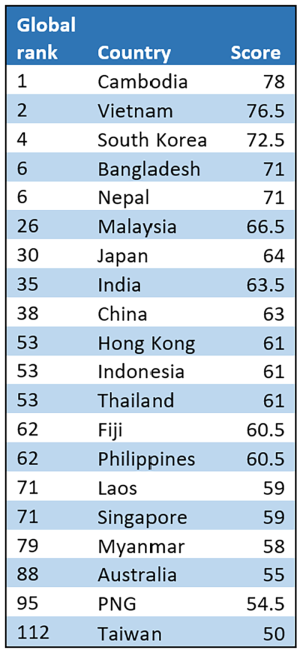
A mixed group of Asian countries are leading the world’s return to normality after COVID according to the latest edition of the Nikkei COVID Recovery Index. But since these numbers were released in early July the rise of the new BA.4 and BA.5 subvariants of the omicron strain have raised concerns in various countries about the recovery. The higher a country is ranked, the closer it is to recovery, measured by factors including lower infection and death rates, better vaccine coverage and fewer restrictions on movement.
ON THE HORIZON
PNG'S LONG WAIT
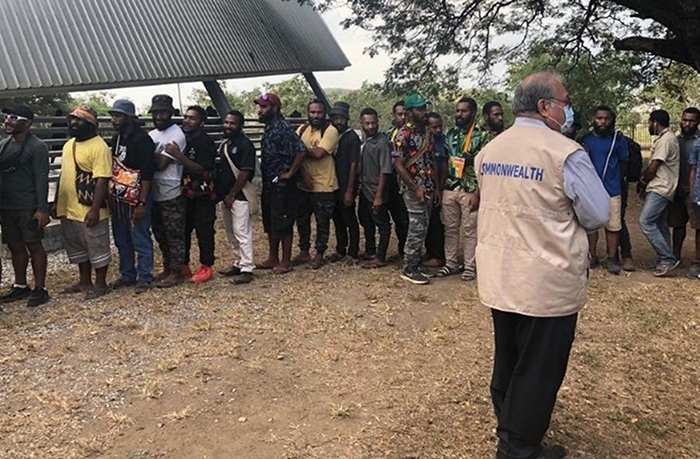
An Observer watches PNG’s voting. Picture: The Commonwealth
The political negotiating over who will be running Australia’s closest neighbour has been officially delayed for two weeks after Governor General Bob Dadae agreed to an extension for the vote counting in Papua New Guinea’s election.
He said on Tuesday he had accepted rising calls from the Electoral Commission for the extension of vote counting until August 12 from the earlier deadline of July 29. He said the action, which he had previously resisted, would save the time and resources involved if the slow counting so far led to the declaration of a failed election.
But Dadae has also joined members of an observer mission from The Commonwealth in expressing concern about the conduct of the vote for 118 members of the PNG House of Representatives.
He said the Commission must look at what it had done wrong leading into the 2022 election, and start planning as early as 2023 for the 2027 elections. And he called for the introduction of a biometric voting system to avoid the problems that have emerged with this election.
Meanwhile the Observer Group, led by former Nauru president cut Nauru, Baron Waqa, has also called for an urgent review of the election and expressed sadness about the growing election-related violence.
The interim report criticises the highly centralised Electoral Commission and says up to 50 per cent of voters were not on the rolls causing public dissatisfaction and disenfranchising “high numbers of eligible voters”.
The Commonwealth wants to see immediate reforms to strengthen voter registration; the creation of a collaborative and decentralised Electoral Commission that is properly funded by the government, along with a national network to support voter education and participation.
ABOUT BRIEFING MONTHLY
Briefing MONTHLY is a public update with news and original analysis on Asia and Australia-Asia relations. As Australia debates its future in Asia, and the Australian media footprint in Asia continues to shrink, it is an opportune time to offer Australians at the forefront of Australia’s engagement with Asia a professionally edited, succinct and authoritative curation of the most relevant content on Asia and Australia-Asia relations. Focused on business, geopolitics, education and culture, Briefing MONTHLY is distinctly Australian and internationalist, highlighting trends, deals, visits, stories and events in our region that matter.
We are grateful to the Judith Neilson Institute for Journalism and Ideas for its support of Briefing MONTHLY and its editorial team.
Partner with us to help Briefing MONTHLY grow. For more information please contact [email protected]

This initiative is supported by the Judith Neilson Institute for Journalism and Ideas.

